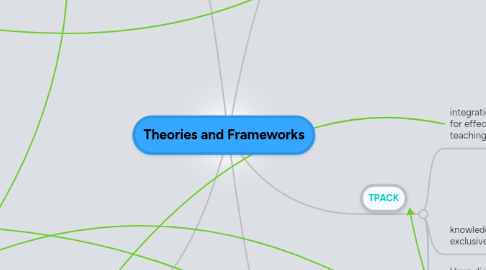
1. Cognitive Load
1.1. information processing used to explain the limits of working memory
1.1.1. working memory can handle 7 plus/minus 2 connected items at once
1.2. learning requires maximal use of limited working memory
1.3. to get to long term memory need to create connections between existing memory and data in the working memory creating schema
1.4. prior knowledge is key in learning
1.5. memory systems are active, organized processors of information
1.5.1. processing information can over/under load working memory
1.6. what things look like and how they are organized matters
1.6.1. Ex. in power points its better to have fewer words so the working memory isn't overloaded trying to listen, read and write notes all at once
1.7. chunking, repetition
2. Learning Theories
2.1. Connectivism
2.1.1. starting point is the individual
2.1.2. capacity to learn more is crucial
2.1.3. learning and knowledge rests in diversity of opinions
2.1.4. learning is a process of connecting sources
2.1.5. nurturing and maintaining connections is key for continual learning
2.1.5.1. each connection is a learning possibility
2.1.6. currency/accuracy is the intent of activities
2.1.7. acknowledges shifts in society
2.1.7.1. provides insight into learning skills and tasks needed to flourish in the digital era of today
2.2. Constructivism
2.2.1. learning is constructed
2.2.1.1. prior knowledge influences what new/modified knowledge they will construct
2.2.2. based on experiences
2.2.3. emphasizes authentic, challenging projects that includes students, teachers and experts in the learning community
2.2.4. encourages active teaching techniques
2.2.4.1. experiments, hands on
2.2.5. teacher guides activity but participant is active
2.2.5.1. learner based
2.3. Behaviourism
2.3.1. the environment associates 2 things together
2.3.2. learning is a complex process of responses to several kinds of distinct stimuli
2.3.3. key to effective teaching is to discover the best consequence to shape behaviour
2.3.4. observable behaviour, not internal thought processes create learning
2.3.5. the environment creates learning and determines what is learned, not the individual learner
2.3.6. teacher centered
2.3.6.1. direct instruction/teaching
2.3.7. breaking down tasks to simplify it, practice makes perfect, modelling
3. Technology Theories
3.1. Media Ecology
3.1.1. study of media as environments
3.1.2. technology influences society
3.1.3. looks at how media affects human perception, understanding, feeling, and value
3.1.4. looks into how our interaction with media faciliates or impedes our chances of survival
3.2. SCOT
3.2.1. Social Construction of Technology
3.2.2. the ways a technology is used can't be understood without understanding how the technology is embedded in its social context
3.2.3. human action shapes technology
3.2.3.1. explains how technologies arise
3.2.4. also a methodology
3.2.4.1. formalizes the steps and principles to follow when one wants to analyze the technological failures/successes
4. TPACK
4.1. integration of 3 key knowledges for effective learning and teaching
4.1.1. pedagogical knowledge
4.1.1.1. knowledge about how to teach
4.1.2. content knowledge
4.1.2.1. knowledge about the subject matter
4.1.3. technology knowledge
4.1.3.1. knowledge of the different types of technology tools that can be integrated into teaching and how to use them
4.1.3.1.1. alignment
4.1.3.1.2. accessibility
4.1.3.1.3. assessment
4.1.3.1.4. reinforcement
